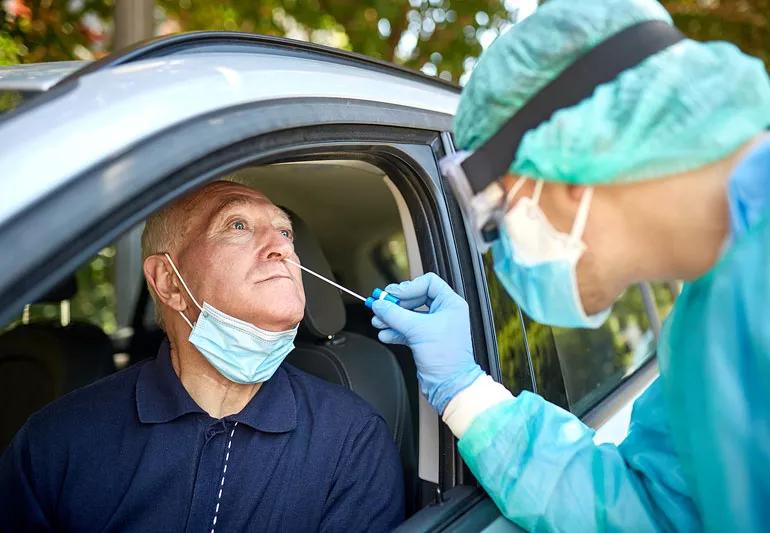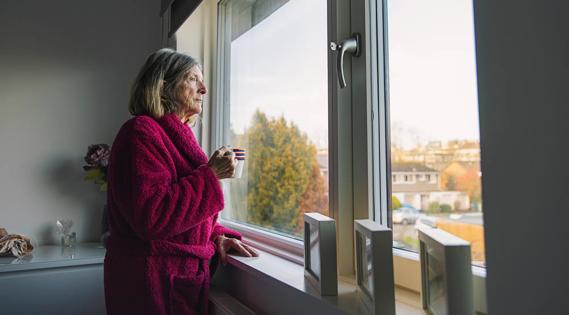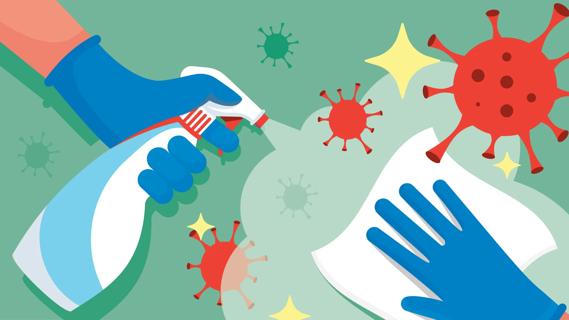Advertisement
An expert weighs in

COVID-19 tests are again gaining focus as the nation experiences the biggest surge so far of the coronavirus pandemic.
Advertisement
Cleveland Clinic is a non-profit academic medical center. Advertising on our site helps support our mission. We do not endorse non-Cleveland Clinic products or services. Policy
With cases rising rapidly in all corners of the United States, not only are more people being tested but more people are seeking out tests or wondering if they should get tested because of potential exposure.
But just as it was at the beginning of the pandemic, testing efforts have, at times, been hampered by a shortage of materials for testing, leading the Centers for Disease Control and Prevention (CDC) to publish guidance for local and state health departments as to which populations should be tested for coronavirus.
To understand who should get tested for COVID-19 and how long results of your COVID-19 test might take, we checked in with pathologist Brian Rubin, MD, PhD.
Effective testing is essential in helping slow the spread of the virus by identifying those who have the virus and enabling treatment or isolation. Testing is also crucial to learn more about how the virus spreads and how prevalent it remains in a given community.
But for those reasons, too, health officials have to be careful that they’re being efficient with their tests. In other words, with ongoing shortages still an issue, the importance of making sure those most in need get tested means not everyone should be getting tested.
Advertisement
As we’ve learned more about how the virus spreads, so, too, has the CDC tweaked its recommendations. Besides testing for people who have symptoms of COVID-19 or upon reference by your healthcare provider or state health department, the CDC now suggests testing for asymptomatic patients who have been exposed to someone with a confirmed case.
According to updated guidance, the CDC says, “Due to the significance of asymptomatic and pre-symptomatic transmission, this guidance further reinforces the need to test asymptomatic persons, including close contacts of a person with documented SARS-CoV-2 infection.”
If you haven’t been exposed to the virus and don’t show any symptoms of COVID-19, though, Dr. Rubin makes it simple: You don’t need a test. The one exception, he adds, is if you’re due to have a procedure in a hospital or doctor’s office setting and, generally, your healthcare provider will provide you with instructions in that situation.
As with so many other aspects of COVID-19, there’s no direct answer. In many cases, a person with the virus would test positive around three-to-five days after contracting it; the CDC itself says the virus has a median incubation time of four to five days. That’s about the same average amount of time it takes for symptoms to develop, though the CDC notes the incubation period could be anywhere from two to 14 days.
In other words, getting tested the day after a potential exposure means you’ll have a very high chance of a negative test result even if you have been infected.
As for how long you’d have to wait to actually get tested, it really depends on where you live because wait times vary not just from city-to-city and state-to-state but from system-to-system. In the same city, you could get a wide variety of wait times.
While some people may face little delay, others may encounter hours-long lines or a wait of several weeks for an appointment to receive a test.
Again, it depends. According to Dr. Rubin, many patients may be able to get test results within 24 hours. But, depending on where the test is sent, it could take up to two weeks in some cases. It’s one more of those frustrating variables of COVID-19.
“You could get a result within minutes with some tests,” Dr. Rubin says. “But if it has to be sent to an outside laboratory and that lab is backed up, it could take a few weeks.”
That wait could also increase as cases continue to skyrocket and so, too, do tests. More volume means more of a wait.
Advertisement
Learn more about our editorial process.
Advertisement

Studies have shown promising results, but additional research is needed

Infection and inflammation can cause you to lose your voice and have other voice changes until you’re fully healed

A COVID-19 infection can bring on depression or anxiety months after physical symptoms go away

Just like the flu, COVID-19 continues to evolve every year with new and smarter variants

The latest omicron subvariants carry specific mutations that may allow the SARS-CoV-2 virus to be better at evading immune protection

You can work out with mild COVID-19, but not in a gym, and listen to your body and don’t overdo it

Most people can return to work and regular life when they’re symptom-free for 24 hours

Lysol Disinfecting Wipes are just one of more than 500 products approved by the EPA for protection against the SARS-CoV-2 virus that causes COVID-19

If you’re feeling short of breath, sleep can be tough — propping yourself up or sleeping on your side may help

If you fear the unknown or find yourself needing reassurance often, you may identify with this attachment style

If you’re looking to boost your gut health, it’s better to get fiber from whole foods